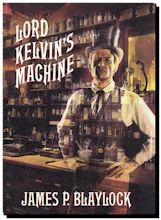Doughnuts
Front cover and interior illustrations by Phil
Parks
Photographs by Vicki Blaylock
Airtight Seals Allied Production
US Hardcover Limited Edition
57 pages; $50.00
|

|
|
REFERENCES:
|
|
|
Fantasy,
Horror
|
|
|
|
|
Homunculus
Illustrated by Ferret
Morrigan Publications
UK Hardcover Limited Edition
ISBN 1-870338-40-5
244 pages; £11.95
|

|
|
REFERENCES:
|
|
|
Fantasy,
Science
Fiction, Horror
|
|
|
|
|
Lord Kelvin's Machine
James P. Blaylock
Illustrated by J. K. Potter
Arkham House
US Trade Hardcover
ISBN 0-87054-163-3
263 pages; $19.95
|

|
|
REFERENCES:
|
|
|
Science
Fiction, Fantasy
|
|
|
|
|
All Reviewed by Rick Kleffel © 2002
|
|
With the recent release of his latest novel "All
the Bells on Earth", James P. Blaylock has proved himself to be
among the front-running authors working in speculative fiction. The
interest in his work has prompted the re-release of some of his
earlier works, and some new works, in deluxe, illustrated editions.
For the Blaylock reader, these three books are extremely
well-produced, beautifully illustrated and well worth the various
premium prices you're likely to have to pay after you've managed to
hunt them down. Yes, the packages are wonderful; but it's the content
that matters, and the content in these books most certainly lives up
to the deluxe packaging.
In "Doughnuts", Blaylock offers us another glimpse at Walt, the
main character of "All the Bells on Earth", and into the heart of
obsession, compulsion and release. It's a small story, barely filling
up the 58 pages, even when padded with an introduction by Lewis
Shiner, an appreciation by Lucius Shepard and an afterword by Tim
Powers. But it's a great Blaylock story, filled with the same tiny
observations and bits of humor that make his other work so unique. In
this story he eschews the supernatural and weird in favor of the
mundane and commonplace, with excellent results. The other
contributor's offer insights into this and other work, while the
illustrations, which are simply pasted-in photos by the author's
wife, are perfectly evocative of the kind of shenanigans in which
Blaylock specializes. Phil Park's cover is literally the icing on the
cake, in this case, a cake doughnut.
"Homunculus" and "Lord Kelvin's Machine" offer glimpses into
Blaylock's earliest work, and are substantially different from any
other novels he has written. The wry sense of humor and the delight
in small human foibles are perfectly in place, but the stories are
both pure steampunk, "Homunculus" being the beginning and "Lord
Kelvin's Machine" the continuation of the adventures of Langdon St.
Ives, a Victorian pseudo-scientist, explorer and adventurer.
"Homunculus" introduces St. Ives, his companions Bill Kraken, Jack
Owlesby and Captain Powers, and his nemesis, the evil hunchback
Doctor Narbondo. "Homunculus", which won the Philip K. Dick Award in
1988, is a dense, mysterious novel set in an apocalyptically-inclined
London, where Nardondo has succeeded in bringing the dead back to
life to serve as free sweatshop labor, while a street preacher waits
for a dirigible piloted by a skeleton to land on Hampstead Heath. The
line-drawing illustrations by Ferret are perfectly suited to the
subject, and thoroughly enjoyable, contributing the perfect air of
Victoriana to the proceedings.
"Lord Kelvin's Machine" follows three further novella-length
adventures of St. Ives as he tries to prevent Narbondo from
destroying the world, travels in time and fights a Dickensian cast of
killers in London. This book is illustrated by J. K. Potter, whose
photo-collages, though the polar opposite of Ferret's line drawings,
are also uniquely suited to Blaylock's steampunk style.
Neither "Homunculus" or "Lord Kelvin's Machine" is a traditional
Blaylock novel, since they're not set in contemporary Orange County,
California. But despite the steampunk setting, Blaylock's peculiar
sensibilities are full intact. His unique blend of weird characters
and nearly supernatural events are exaggerated in the Victorian
setting. In "Homunculus" and "Lord Kelvin's Machine", Blaylock is
fully determined that both he and the reader are just going to have
fun. Even without all this deluxe packaging, that would be the case;
but if you're going to have fun, why not go all the way? That's the
kind of question that Blaylock himself might ask, and these three
books are an excellent answer to that question.


